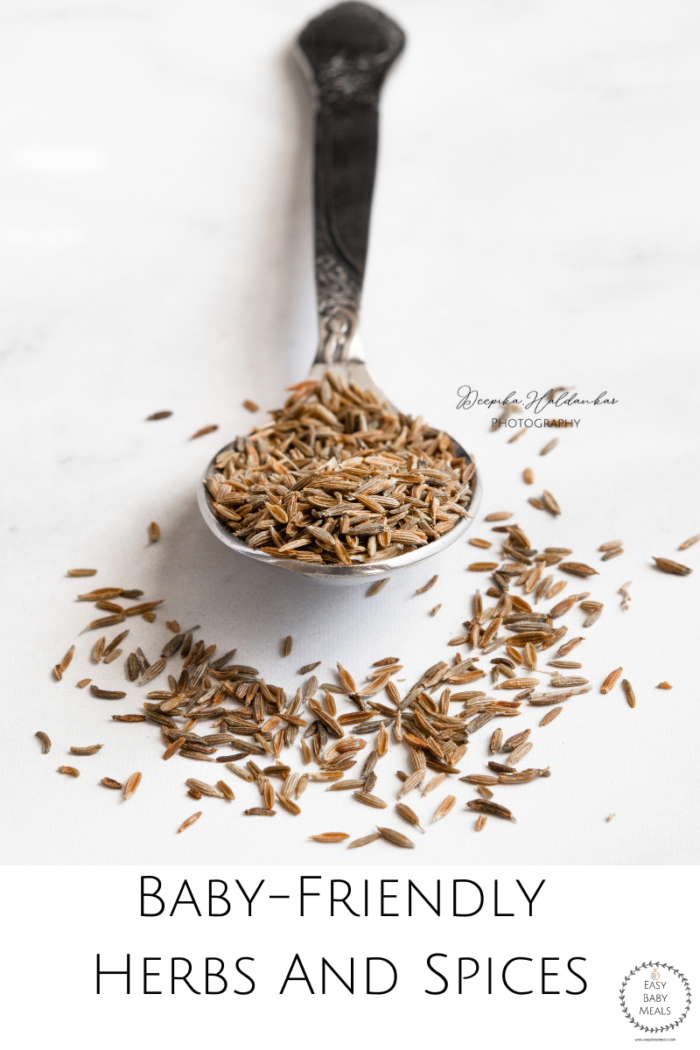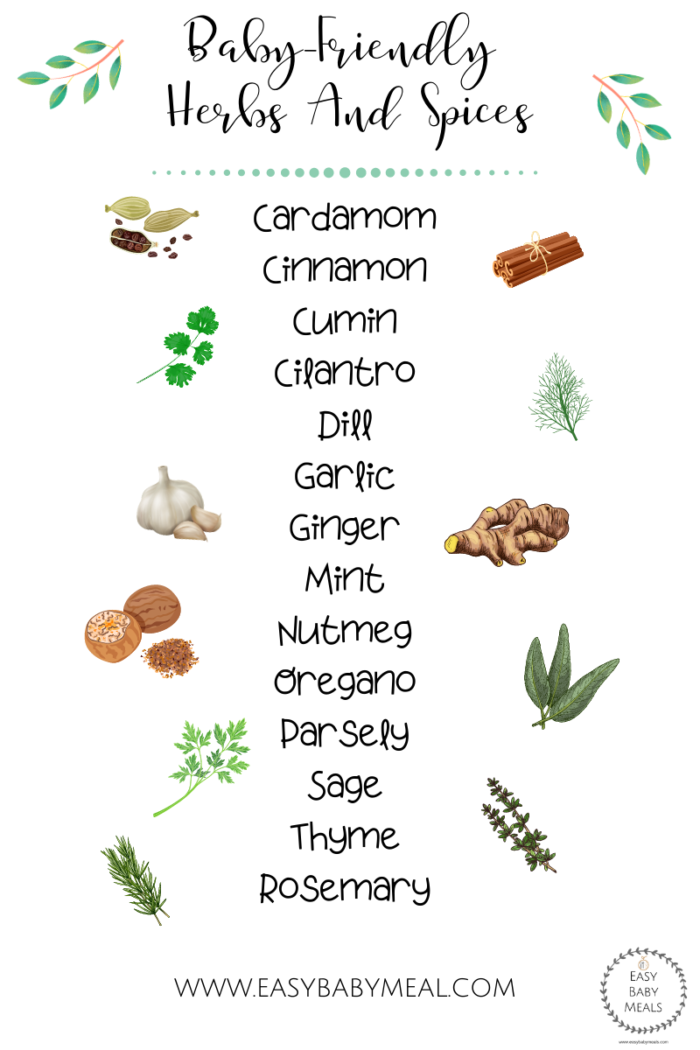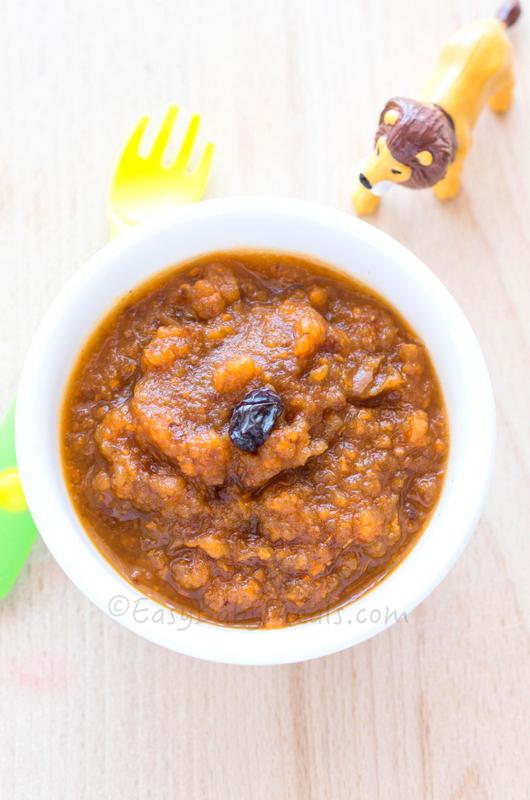There are a variety of herbs and spices that are baby-friendly. Let’s take a look at them.

Hi everyone. Last month we talked about the Five Spices you need to try this year. Here is the article.
This year I am taking a personal journey to try out new spices and herbs from different corners of the world in my kitchen.
Hence, to begin with, I wrote the earlier article. Today I am going to talk about Baby-Friendly Herbs And Spices.
It was a crucial issue when I started making baby food for my daughter. She absolutely hated bland food; hence my experiments with herbs began with her introduction to food.
In today’s article, I will talk about Baby-Friendly Herbs And Spices and how you can introduce them to your little ones.
I have shared some of the recipe ideas with the use of these spices and herbs as well.
So let’s begin.
Why add herbs and spices to baby food?
Will you like your food bland without any seasoning? No. Then why should a baby have such a kind of food when they are just starting to have their first introduction to actual food.
Babies have from 2,000 to 10,000 taste buds. Imagine with so many taste receptors that they are exposed to just a few types of foods and flavors.
The best way to nurture flavor receptors is to expose them to various tastes as early as possible. This, in turn, encourages them to try new foods as they grow older.
The process is much earlier than you think. Even while in the mother’s womb, babies can taste their mother is eating through amniotic fluid. Breast milk takes on flavors of the mother’s daily diet, which familiarizes the baby with tastes and flavors.
Why aren’t the babies given exposure to herbs and spices when it’s their turn to start eating table food.
When I started to research what was available in store for 6 months old, I came across limited options. It was just a handful of bland purees and baby cereal.
Of course, now the scenario has changed quite a bit. I am talking about 8 years back.
That time it was just dull-looking tasteless purees, no wonder my daughter didn’t eat them after getting exposed to flavors in her mama’s tummy.
Babies all around the world are introduced to herbs and spices at a very young age.
In countries like India, Latin America, and the Middle East, babies are introduced to various food, with added seasonings. This helps expand their palate and gives a boost of antioxidants to the baby’s developing system.
Aromatic spices also help avoid adding salt and sugar to baby food as flavoring agents.
Babies are experiencing a whole new world of food, and I feel introducing them to different flavors is important. And that’s what I did.
Also, the only way my daughter accepted her food was through the addition of herbs and spices.
So which are the baby-friendly herbs and spices?
When I am talking about herbs and spices here, I am talking about Aromatic herbs and spices.
There is a difference between Aromatic Spices and Hot Spices.
Aromatic herbs and spices like cinnamon, nutmeg, ginger, coriander, garlic, turmeric, cumin, cardamom, oregano, rosemary, dill, mace, etc., add their unique aroma to the food.
There is no “HOT” element in them. So they are excellent to be introduced to baby food. THE “HOT” part of the spices stimulates the pain receptors on the tongue.
Infants might have a strong reaction to these hot spices like all kinds of chilies and peppers, which can lead to an aversion to that particular food in which it’s added.
With chiles out of the equation, let’s see which are some Aromatic Baby-Friendly Spices:

The herbs and spices mentioned above are to name a few. These can make a great starter for your baby’s food.
How should I introduce herbs and spices to my baby?
While introducing herbs and spices to baby food, it is important to take it slow. A dash or a pinch initially goes a long way.
When I first introduced my daughter to aromatic spices, I waited for 4 to 5 days, watched out for any reaction, and then went on to another herb/spice.
I started by adding cinnamon and cardamon powder to fruit purees. Then went on to garlic and other fragrant spices for vegetables.
Every fruit and vegetable has its own distinct taste and smell. Adding herbs enhances its taste and flavor and makes it more palatable for babies.
For instance, steamed broccoli can be a big turn-off for your baby. But steam broccoli with added garlic powder and cumin powder can be a flavorful bet.
Hence, adding herbs and spices to your regular baby food will enhance the flavor and help in introducing different tastes and textures of food with aroma.
This can help develop a palate, which is more adventurous and ready to experiment with food.
So next time when you serve apple and oats puree, try adding a pinch of cinnamon powder to it. You won’t regret it, that’s for sure.
Let’s go through some of the baby food recipes that incorporate herbs and spices:
Apple Pear Puree- (6 months and above)- Cinnamon

Yellow Squash With Zucchini And Mint: (6 months and above)- Mint

Winter Squash With Cumin (8 months and above)- Cumin

Apple With Carrots And Raisins (8 months and above)- Nutmeg

Spaghetti Squash Casserole (1 year and above)- Basil And Oregano

The above mentioned are a few ideas of how you can incorporate spices and herbs in your baby’s everyday food.
You can browse around this website to find more recipes and inspirations.
Give these a try, and let me know how it went. I will talk to you all again soon. Take care and Happy Cooking.
For more recipes along with tips and tricks, subscribe to our mailing list. You can also follow us on Facebook, Pinterest, Twitter, and Instagram.
Important Note:
Talk to your baby’s Pediatrician before starting new food.
© EasyBabyMeals. All the content is copyright protected. Do not use without prior permission.